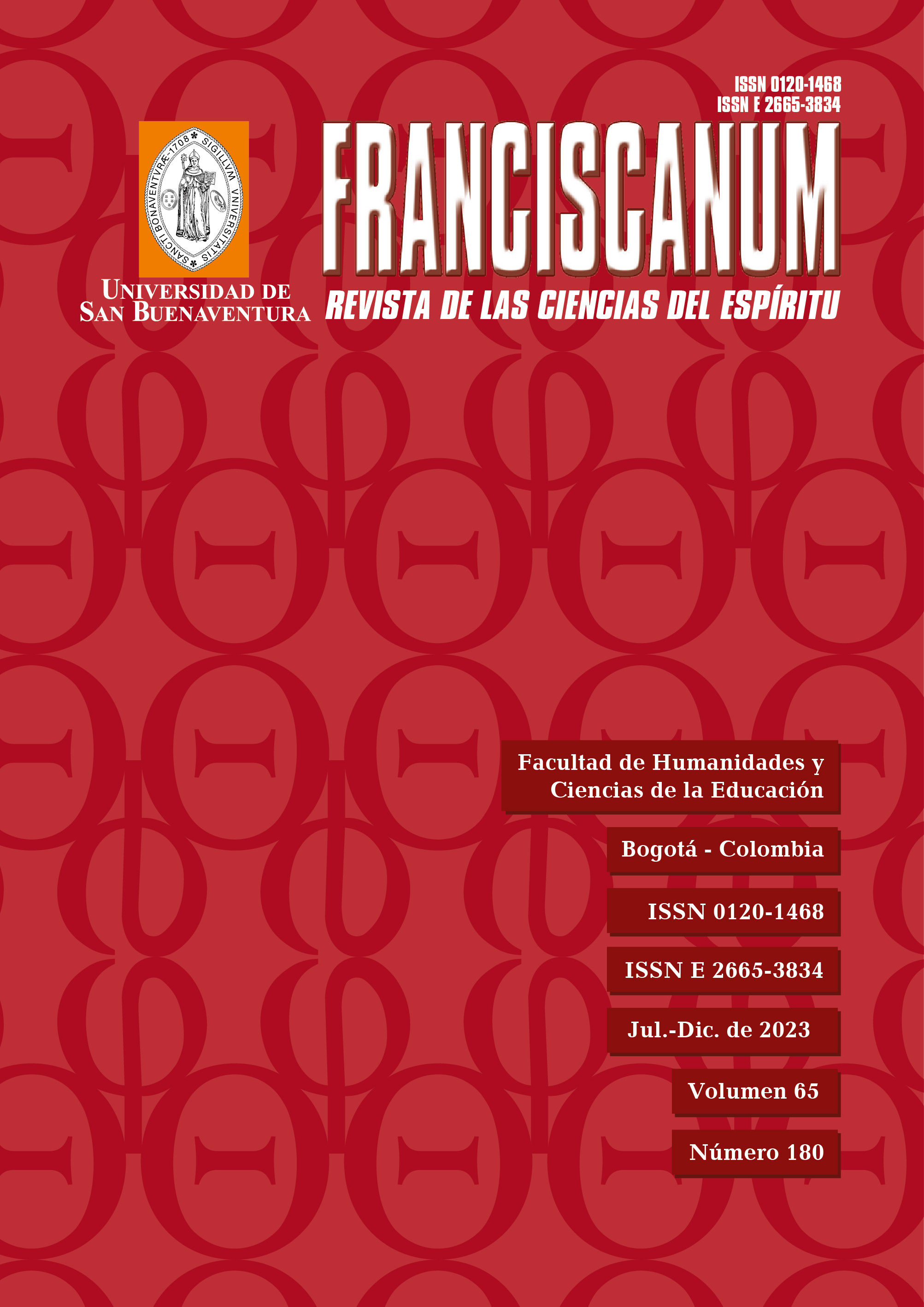Esta revista proporciona un acceso abierto inmediato a su contenido, basado en el principio de que ofrecer al público un acceso libre a las investigaciones ayuda a un mayor intercambio global de conocimiento.
Por tanto se acoge a la Licencia Creative Commons 4.0 Atribuciones Reconocimiento – CompartirIgual (by-sa): Se permite el uso comercial de la obra y de las posibles obras derivadas, la distribución de las cuales se debe hacer con una licencia igual a la que regula la obra original.
http://creativecommons.org/licenses/by-sa/4.0/
En este mismo sentido y en consonancia con la política del Acceso abierto, se aclara que los autores mantienen sus derechos sobre los artículos, sin restricciones y, del mismo modo, mantienen sus derechos de publicación, sin restricciones. Solamente se les solicita que referencien el número de la revista Franciscanum en donde apareció inicialmente el artículo.
Resumen
The question about man appears again in contemporary philosophy no longer as an eidetic, but as an existential question (if it
ever ceased to be so). Martin Buber, Austrian-Jewish thinker (1878- 1965), seeks with his thought to recover the value of man, adding
to the existentialist influences of Kierkegaard and Nietzsche, and to the phenomenological influence of Husserl, the dialogic principle;
that is, the necessity of the other as a You for the becoming of the I as a person. This last concept, person, has its origin in the philosophical discourse in the Trinitarian and Christological Theology of the Fathers of the Church, among them, Augustine of Hippo. In this article we want to make explicit the presence of this Augustinian conception of person in the personalism of Martin Buber. To do so, we will identify the most important characteristics of the person for the bishop of Hippo, which are explained in detail in his work De Trinitate, and then we will link these characteristics with those that are central to Buber’s thought. Our hypothesis is that we can find in Buber’s anthropology traces of Augustine’s thought, influenced especially through existentialism and phenomenology.
Palabras clave:
Referencias
Augustine. The Confessions, New York: New City Press, 1996.
Augustine. Obras de San Agustín en edición bilingüe, Tomo V, Ma¬drid: BAC, 1956.
Barret, Lee C. Eros and Self-Emptying: The Intersections of Augustine and Kierkegaard, Cambridge: Wm. B. Eerdmans Publishing, 2013.
Bates, Mathew. The birth of the Trinity, Jesus, God, and Spirit in New Testament and Early Christian Interpretations of the Old Testament, Oxford: Oxford University Press, 2015.
Brousek, Daniel. «El ser humano en clave de relación en el De Tri¬nitate de San Agustín», Master diss., Facultad de Teología Pontificia y civil de Lima. Master’s Thesis, 2020.
Brum, José Thomaz. «Pascal e Nietzsche», Cadernos Nietzsche, 8 (2000): 35-41.
Buber, Martin. Niccolò Cusano e Jakob Böhme. Per la storia del proble¬ma dell’individuazione, Critic edition in charge of Francesco Ferrari, Genova: Il nuovo melangolo, 2012.
Buber, Martin. Between man and man, London-NewYork: Routledge, 2002.
Buber, Martin. The way of Man according to the teaching of Hasidism, Pennsylvania: Pendle Hill, 2002.
Buber, Martin. I and Thou, New York: Charles Scribner’s Sons, 1970.
Buber, Martin. Pointing the way, New York: Harper and Brothers, 1957.
De Simeone, Rusell. “Dios Uno, Dios Trinidad”, en: J. Oroz Reta - J.A. Galindo Rodrigo, El pensamiento de San Agustín para el hombre de hoy. II. Teología dogmática, Valencia: Edicep, 2005, 187-237.
Dobre, Catalina. «Søren Kierkegaard y Martin Buber: el mundo de la relación y el diálogo», Revista de Filosofía Universidad Iberoamericana, 135 (2013): 155-176.
Flamarique, Lourdes. «La fenomenología de la interioridad en Agus¬tín de Hipona y su interpretación existencial en Kierkegaard y Heidegger», Anuario Filosófico, vol. 49/2 (2016): 317-338.
Friedmann, Maurice. The Life of Dialogue, Londres-Nueva York: Chicago University Press, 2002.
Husserl, Edmund. Cartesian Meditations, Dordrecht: Kluwer Aca¬demic Publishers, 1999.
Jañez, Tarsicio. «”Ser Persona” en San Agustín. Dinamismo vital he¬cho relación a imagen de la Trinidad», Estudio Agustiniano, vol. 56 (2021): 451-485.
Justin. Apologies, Oxford: Oxford University Press, 2009.
Lebreton, Lucie. «Nietzsche, lecteur de Pascal: ‘le seul chrétien lo¬gique’», Revue philosophique de la France et de l’étranger, no. 2 (2017): 175-194, consultada en 20 de octubre, 2022. https://www.cairn.info/revue-philosophique-2017-2-pa¬ge-175.htm.
Leocata, Francisco. «Idealismo y personalismo en Husserl» [online]. Sapientia, 55 (2000): 397-429.
Peres, Sávio. «San Agustín y la fenomenología: la concepción de la atención», Rev. abordagem gestalt, vol. 24 (2018): 438-448.
Plotinus. «Ennead IV, V y VI», The Enneads, Cambridge: Cambridge University Press, 2018.
Ratzinger, Joseph. Dogma and Preaching, San Francisco: Ignatus Press, 2011.
Tertulian, Against Praxeas, Suffolk: Richard Clay and Sons, 1920.
Torres, Juan Facundo «La posibilidad redentora del lenguaje. Del «nombre propio» en Rosenzweig al “decir tú” en Buber», Nuevo Pensamiento, vol. 11, no. 18 (2021): 295-310, 2021.
Uña Juárez, Agustín. «Plotino: el sistema del Uno. Características generales», Anales del seminario de Historia de la Filosofía, vol. 19 (2002): 99-128.




















